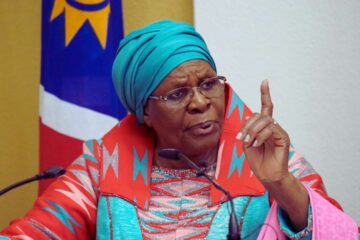Julia Heita
Journalists in Namibia mostly work freely, but some face suspensions for expressing critical views, says Reporters Without Borders in its latest press freedom report.
The report states that while the independent press enjoys relative freedom, it is not free from political pressure, especially from government influence over certain media outlets.
It notes that media outlets did not face major pressure before the November 2024 elections, but the government still controls board appointments at key publications, shaping their editorial direction.
“Although journalists are mostly free to report, the media landscape remains influenced by political control, especially in the case of state-owned outlets,” the organisation said.
Namibia’s legal framework offers constitutional protection for press freedom.
The judiciary often supports journalists facing legal attacks.
In 2022, parliament passed an access to information law to support investigative journalism, though it lacks full protection for sources.
The media operate under a self-regulatory code of ethics, and the public can take complaints to a media ombudsman.
The report shows that state-owned media benefit from favourable economic conditions.
However, this has caused tension. In 2022, workers at the Namibia Broadcasting Corporation went on strike for better pay and permanent contracts.
Independent outlets struggle more, with government policies pushing advertising to pro-government platforms.
This limits funding for critical reporting.
The sociocultural environment allows coverage of social issues, but journalists sometimes face verbal attacks from officials, including ministers and the president, who accuse them of being too negative.
These attacks can lead to intimidation. Still, there have been no reports of arrests or killings of journalists in Namibia since January 2025.
“While verbal attacks against journalists are not uncommon, there have been no reported cases of detentions or killings of journalists in Namibia since January 2025,” the report states.
Reporters Without Borders urged the government to act on these challenges to keep press freedom strong.
Namibia marked World Press Freedom Day under the theme ‘Reporting in the Brave New World – The Impact of Artificial Intelligence on Press Freedom and the Media’.
President Netumbo Nandi-Ndaitwah said the media must inform the public based on facts, especially as AI grows and affects journalism.
She said AI can improve reporting, but also brings risks like misinformation.
“I caution Namibian citizens, media professionals, and journalists in particular, to refrain from spreading unverified information which can undermine service delivery, freedom of the press, and democratic governance,” she said.
She reminded journalists to follow the Code of Ethics and work in the public interest. Namibia ranked second in Africa for press freedom in 2025, keeping its strong global position.
“The government places a high value on the fundamental right of freedom of speech and expression, including media freedom, as enshrined in the Namibian Constitution,” Nandi-Ndaitwah noted.
Revenue Woes Hurt Newsroom Morale
The Namibia Media Professionals Union said it is concerned about how media managers use “declining revenue” to justify poor working conditions.
It warned that economic struggles are being used to silence questions about fair labour practices and editorial independence.
“Under the veil of austerity, newsroom executives continue to maintain executive comforts and entitlements while journalists are left without decent wages, proper benefits, or job security,” said NAMPU acting secretary general Jemima Beukes.
Beukes said financial hardship is being used as a quiet threat to press freedom.
Journalists carry the burden of newsroom survival while managers avoid financial transparency and, in some cases, suppress stories that could affect their interests or advertisers. NAMPU said the real crisis is not just technology but how journalists’ rights and dignity are ignored.
NAMPU called for transparency in newsroom governance.
It said journalists should know how resources are used, why managers still benefit, and how editorial decisions are made.
The Federation of Southern African Journalists (FESAJ) warned of serious threats to press freedom in the region, including political repression, corporate control, and AI’s rising influence.
FESAJ said many governments are using violence, harassment, and laws to silence journalists. Censorship is growing, making it harder to do independent reporting.
It also said some newsroom leaders focus on personal gain while ignoring journalists’ needs.
Poor pay, bad working conditions, and a lack of job security are common.
FESAJ said this exploitation weakens press freedom. It called on governments, media owners, and newsroom managers to protect journalists and support independent media.
“Journalists must be able to work without fear of political or corporate interference, and newsroom environments must prioritise the well-being and rights of journalists over profits and managerial perks,” it said.




